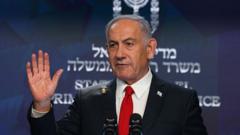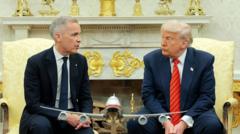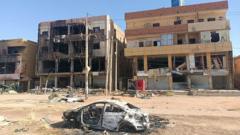The U.S. State Department has declared new sanctions against Sudan after confirming the use of chemical weapons in the internal conflict. This response continues the pressure on Sudan's military and paramilitary forces, which have been involved in serious human rights violations over the past two years as the country faces a humanitarian crisis.
US Imposes New Sanctions on Sudan After Chemical Weapons Investigation

US Imposes New Sanctions on Sudan After Chemical Weapons Investigation
Following allegations of chemical weapon usage in Sudan's ongoing civil war, the United States announces additional sanctions targeting the nation's military and paramilitary forces.
The United States has declared its intention to impose new sanctions on Sudan following an investigation that revealed the use of chemical weapons in the civil war between the Sudanese military and the paramilitary Rapid Support Forces (RSF). According to State Department spokesperson Tammy Bruce, restrictions on U.S. exports to Sudan and limits on financial borrowing will take effect starting June 6.
Both sides of the conflict have been previously accused of committing war crimes, and the ongoing fighting has resulted in horrific casualties, with over 150,000 people estimated to have lost their lives since the violence erupted two years ago. Despite military advancements that allowed the Sudanese army to retake control of the capital, Khartoum, fighting persists in various regions throughout the country.
While specific details about the chemical agents were not released by U.S. authorities, The New York Times reported previously that chlorine gas was deployed in separate incidents, which can prove both painful and life-threatening. The U.S. has called for the Sudanese government to halt any further use of chemical weapons and to meet its obligations under the Chemical Weapons Convention (CWC), a treaty aimed at eliminating such armaments globally. Almost all countries, including Sudan, are signatories of the CWC, with few notable exceptions.
The announcement of sanctions is not unprecedented; the U.S. has previously targeted Sudanese leaders amid escalations in the conflict. In January, sanctions were levied against the leaders of both the military and RSF, with accusations pointing towards military leader Abdel Fattah al-Burhan for destabilizing the nation and undermining democratic efforts. The conflict has led to widespread displacement, with around 12 million fleeing their homes and 25 million requiring humanitarian assistance.
Experts suggest that the effectiveness of the new sanctions may be limited, building on prior measures that have failed to prompt significant changes on the ground. The sanctions coincide with rising tensions regarding alleged arms support from the United Arab Emirates to the RSF, with Sudanese officials accusing the UAE of direct involvement before diplomatic ties were strained.
A reliable source within Sudan asserts that these renewed sanctions are a strategic distraction from congressional resistance against arms sales to the UAE amid its involvement in the conflict. Recent legal challenges have also played a role, as a top UN court declined Sudan's appeal to hold the UAE accountable for allegations of genocide.
As the humanitarian crisis deepens in Sudan, resulting in staggering statistics of civilian suffering and casualties, both international and regional dynamics complicate the search for a peaceful resolution.



















